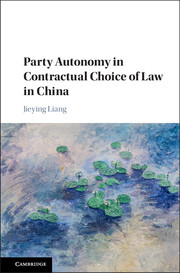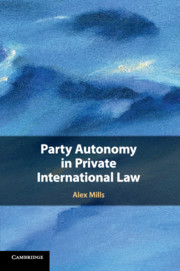Party Autonomy in Contractual Choice of Law in China
The principle of party autonomy in contractual choice of law is widely recognised in the law of most jurisdictions. It has been more than thirty years since party autonomy was first accepted in Chinese private international law. However, the legal rules provided in legislation and judicial interpretations concerning the application of the party autonomy principle are abstract and open-ended. Without a critical understanding of the party autonomy principle and appropriate interpretations of the relevant legal rules, judges have not exercised their discretionary power appropriately. The party autonomy principle has been applied in a way that undermines its very purpose, that is, to protect the legitimate expectations of the parties and promote the predictability of outcomes in transnational commercial litigation. Jieying Liang addresses the question of how, when, and with what limitations, parties' choice of law clauses in an international commercial contract should be enforced by Chinese courts.
- The first comprehensive study in English of the party autonomy principle in Chinese law
- Provides detailed analysis of typical cases
- Offers practical knowledge to anyone entering an international contract or getting involved in a contractual dispute in China
Reviews & endorsements
‘The book analyses party autonomy in PRC law. It considers when the PRC courts will override parties' express choice of law in the social or public interest. It also discusses the likelihood (or not) of PRC courts allowing parties to stipulate non-state law (e.g., the lex mercatoria) as contractual governing law. As a bonus, it sets out the historical and philosophical underpinnings of party autonomy in China. The work is to be commended for its clarity and breadth.' Anselmo Reyes, The University of Hong Kong
‘Private commercial relations with the People's Republic of China have grown significantly in recent years. Mechanisms for international dispute resolution are therefore important. Given differences in substantive law and uncertainty about a commercial partner's legal system, private agreements on the applicable law (party autonomy) become of central importance. Jieying Liang's work is a masterful and comprehensive study of the development of party autonomy and its present status under the 2010 Chinese Conflicts Statute, including limitations resulting from mandatory norms and the ability to choose non-state law. It is an indispensable resource.' Peter Hay, L. Q. C. Lamar Professor of Law Emory University, Atlanta
Product details
February 2018Adobe eBook Reader
9781316766750
0 pages
0kg
This ISBN is for an eBook version which is distributed on our behalf by a third party.
Table of Contents
- 1. The development of the party autonomy principle in China
- 2. The background to the development of party autonomy
- 3. The existence and validity of parties' choice of law
- 4. The 'law' that can be chosen by parties
- 5. Statutory restrictions on party autonomy (I)
- 6. Statutory restrictions on party autonomy (II)
- 7. Ascertainment of the foreign law chosen by parties
- 8. Contractual choice of law under the 'One Country, Two Systems' regime
- 9. The party autonomy principle in the context of the Chinese legal system.






